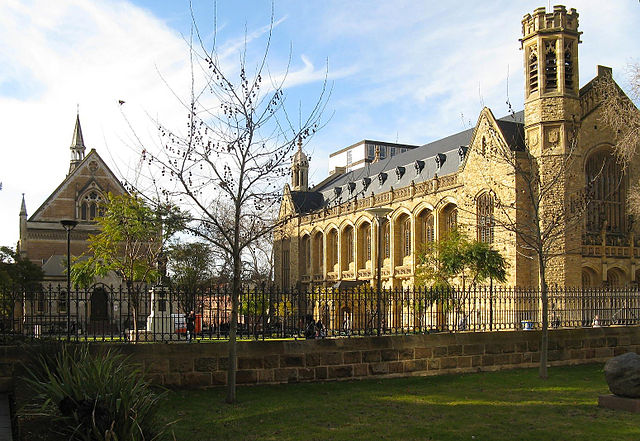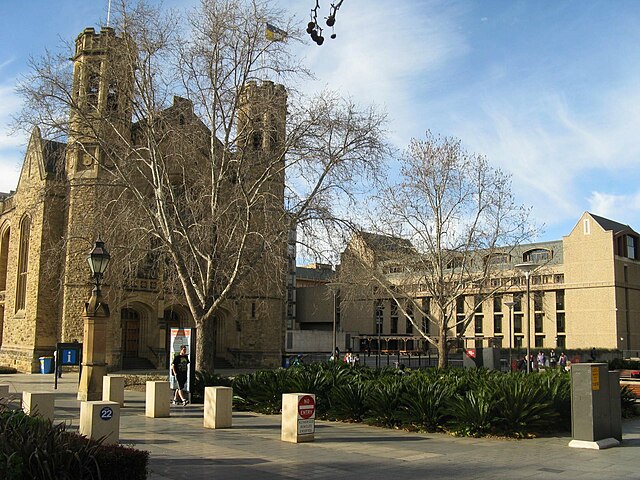
As Thammasat University students grow accustomed to online learning and distance education, some may wish to explore overseas opportunities after they have done their required coursework. Taking an extra class may be informative and help complement main areas of study, giving students new ideas and perspectives and help them to practice their English language usage.
One opportunity to consider may be free massive open online courses (MOOCs) at the University of Adelaide, Australia. Adelaide is the capital city of the state of South Australia, and the fifth-most populous city of Australia.
The University of Adelaide is one of Australia’s leading research-intensive universities and is consistently ranked among the top 1% of universities in the world. Established in 1874, it is Australia’s third oldest university and has a strong reputation for excellence in research and teaching. The University is known for its dedication to the discovery of new knowledge and preparing the educated leaders of tomorrow. Currently, over 25,000 students from more than 90 countries are enrolled at The University of Adelaide.
The Thammasat University Library collection contains a number of books originating from research at the University of Adelaide.
Other books owned by the TU Library were produced by other institutes of higher learning in Adelaide.
The university has been associated with many notable achievements and discoveries, such as the discovery and development of penicillin, the development of space exploration, sunscreen, the military tank, Wi-Fi, polymer banknotes and X-ray crystallography, and the study of viticulture and oenology.
Among notable alumni are Howard Florey, a pharmacologist and pathologist who shared the Nobel Prize in Physiology or Medicine in 1945 for his role in the development of penicillin; and J.M. Coetzee, the novelist and linguist, recipient of the 2003 Nobel Prize in Literature.
The TU Library owns a number of books by and about J. M. Coetzee.
Learning choices
One course available is Understanding Agribusiness, Value Chains, and Consumers in Global Food Systems.
Students will learn about the dynamic business of food and agriculture, exploring value chain thinking and the role consumers play in our rapidly evolving food systems.
As the dedicated website notes:
About this course
Agribusiness is at the core of most economies around the world. The business of feeding people remains both complex and extremely important. According to the World Bank, food and agribusiness is a US $5 trillion industry that represents 10 percent of global consumer spending.
In a global food system impacted by growing populations, economic growth, globalization, climate challenges, disruptive technologies, and evolving consumer demands, we must find smarter ways to produce food and to operate food businesses.
Guided by the team at The Centre for Global Food and Resources, this course will introduce the concepts at the heart of agribusiness; including value chain thinking, the dynamics of markets, and the changing nature of consumer behavior.
You will learn what it is that sets agribusiness apart from other business sectors and the difference between supply chain and value chain thinking. You will gain an understanding of food markets and the distinctive factors that influence them. There will be a focus on the role that consumers play in the value chain – why they make the food choices they do and what changing food demand means for agribusiness. This course will showcase Australian agribusinesses, providing genuine insights into the concepts discussed.
In an increasingly complex sector, this course will help you think differently about the challenges and the opportunities that lie ahead for agribusiness.
What you’ll learn
- How to recognize the characteristics of Global Food Systems
- The multiple variables impacting Global Food Systems
- How to identify value chain thinking and how it differs from supply chain thinking
- The characteristics of agri-food markets, what influences their supply and demand, and what sets them apart from other markets
- The roleplayed by external factors such as population and income growth, globalization, climate change, technology, and international tradein global food systems, agribusiness and value chains
- How to recognize the role the consumer plays in the food system, markets, and value chains
Among the class instructors will be Professor Wendy Umberger, Executive Director, Centre for Global Food and Resources, University of Adelaide and Dr. Alexandra Peralta, Lecturer, Centre for Global Food and Resources, University of Adelaide.

Another MOOC option from the University of Adelaide is World of Wine: From Grape to Glass
In this class, students learn about the principles and practices of how grapes are grown and wine is made. Whether you’re a wine novice or a seasoned oenophile, you’ll learn to confidently describe wine appearance, aroma, flavour and taste.
The relevant website explains:
About this course
Think about your favourite wine. Imagine the brilliance of its colour in the glass, the ripe fruit aromas on the nose, a hint of toasty oak and lingering tannins on the back palate. Perhaps you like a specific wine, but can’t pinpoint the reason why. The attributes that make wine so enjoyable are achieved through the expertise of viticulturists and winemakers, whose decision-making in the vineyard and winery is underpinned by science – to be precise, viticulture and oenology.
The finer details can take years to learn, but in a matter of weeks this course will give you a broad understanding of the principles and practices used to grow grapes and make wine, and their impact on wine appearance, aroma, flavour and taste. You’ll also gain an appreciation for how cutting-edge research is helping to secure the future sustainability of the global wine industry. Whether you’re a wine novice or a seasoned oenophile,, this course is for anyone who loves wine and wine tasting. You’ll even get to make your own wine– virtually at least!
Confidently describe wine appearance, aroma, flavour and taste.
What you’ll learn
- Evaluate and communicate the various sensory attributes of wine using formal descriptive language
- Explain the structure, growth and development of grapevines and objectives of different vineyard management practices
- Contrast the different winemaking techniques employed in the production of different styles of wine
The class will be co-taught by Professor Kerry Wilkinson, Professor of Oenology; Associate Professor David Jeffery, Associate Professor in Wine Science; Associate Professor Cassandra Collins, Associate Professor in Viticulture; and Associate Professor Paul Grbin, Associate Professor of Oenology, all from the University of Adelaide.
Still another potential MOOC is Big Data Fundamentals.
In this course, students learn how big data is driving organisational change and essential analytical tools and techniques, including data mining and PageRank algorithms.
Here is the course description:
About this course
Organizations now have access to massive amounts of data and it’s influencing the way they operate. They are realizing in order to be successful they must leverage their data to make effective business decisions.
In this course, part of the Big Data MicroMasters program, you will learn how big data is driving organisational change and the key challenges organizations face when trying to analyse massive data sets.
You will learn fundamental techniques, such as data mining and stream processing. You will also learn how to design and implement PageRank algorithms using MapReduce, a programming paradigm that allows for massive scalability across hundreds or thousands of servers in a Hadoop cluster. You will learn how big data has improved web search and how online advertising systems work.
By the end of this course, you will have a better understanding of the various applications of big data methods in industry and research.
What you’ll learn
- Knowledge and application of MapReduce
- Understanding the rate of occurrences of events in big data
- How to design algorithms for stream processing and counting of frequent elements in Big Data
- Understand and design PageRank algorithms
- Understand underlying random walk algorithms
Instructors will include Professor Frank Neumann of the School of Computer Science and Dr. Wanru (Kelly) Gao, Lecturer, School of Computer Science, both from the University of Adelaide.

(All images courtesy of Wikimedia Commons)
